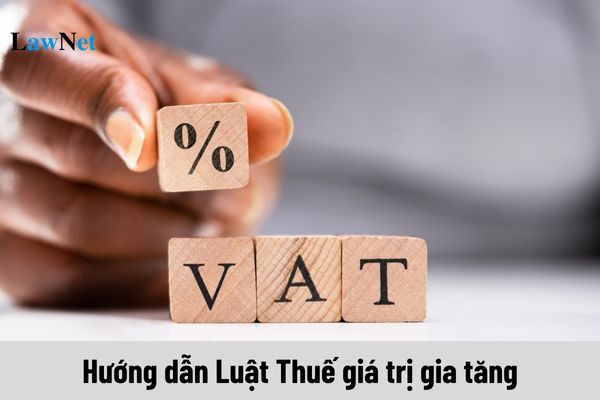What is the newest VAT Law in Vietnam?
What is the newest VAT Law in Vietnam?
The newest VAT Law is VAT Law 2008 which is amended by the following documents:
- Law on Amendment to the VAT Law 2013.
- Law on Amendments to Tax Laws 2014.
- Law on Amendment to the VAT Law, Special Consumption Tax Law, and Tax Administration Law 2016.

What is the newest VAT Law in Vietnam? (Image from the Internet)
What are the applicable VAT rates in Vietnam?
According to Article 8 of the Law on Value-Added Tax 2008 (as amended by clause 3, Article 1 of the Law on Amending the Law on Value-Added Tax 2013, Article 1 of the Law Amending the Law on Value-Added Tax, Law on Special Consumption Tax, and Law on Tax Administration 2016, and Article 3 of the Law Amending Various Tax Laws 2014), and Decree 72/2024 ND-CP, the applicable VAT rates are stipulated as follows:
(1) The 0% tax rate applies to exported goods and services, international transportation, and goods and services not subject to value-added tax as specified in Article 5 of the Law on Value-Added Tax 2008 when exported, except in the following cases:
- Transferring technology, transferring intellectual property rights abroad.
- Reinsurance services carried out abroad;
- Credit provision services;
- Capital transfer;
- Financial derivative services;
- Postal, and telecommunication services;
- Exported products specified in clause 23, Article 5 of the Law on Value-Added Tax 2008.
Exported goods and services are those consumed outside Vietnam, in non-tariff zones; goods and services provided to foreign customers as regulated by the Government of Vietnam.
(2) The 5% tax rate applies to the following goods and services:
- Clean water for production and domestic use;
- Ores for fertilizer production; pesticides and growth stimulants for animals and plants;
- Canal, ditch, pond dredging services for agricultural production; cultivating, caring for, preventing diseases of plants; preliminary processing, preserving agricultural products;
- Unprocessed crop, livestock, aquaculture products, except for products stipulated in clause 1, Article 5 of this Law;
- Semi-processed rubber latex; semi-processed pine resin; fishing nets, ropes, and fibers used to weave fishing nets;
- Fresh food; unprocessed forest products, except timber, bamboo shoots, and products stipulated in clause 1, Article 5 of the Law on Value-Added Tax 2008;
- Sugar; by-products from sugar production, including molasses, bagasse, and mud;
- Products made from jute, sedge, bamboo, rattan, straw, coconut shells, coconut fibers, water hyacinth, and other handicraft products produced from agricultural waste; semi-processed cotton; newspaper printing paper;
- Medical equipment, tools, medical gauze, sanitary napkins; disease prevention and treatment drugs; pharmaceuticals, medicinal materials used as raw materials for the production of medicines for disease prevention and treatment;
- Teaching and learning aids, including models, drawings, boards, chalk, rulers, compasses, and specialized teaching, research, and experimental equipment;
- Cultural, exhibition, sports activities; art performances, film production; import, distribution, and screening of films;
- Children's toys; books of all kinds, except those specified in clause 15, Article 5 of the Law on Value-Added Tax 2008;
- Scientific and technological services as stipulated by the Law on Science and Technology;
- Sale, lease, lease-purchase of social housing as stipulated by the Law on Housing.
(3) An 8% tax rate applies to certain goods and services with reduced VAT (from 10% to 8%) according to Decree 72/2024/ND-CP.
(4) The 10% tax rate applies to goods and services not subject to the 0%, 5%, and 8% tax rates.
Thus, depending on the goods and services subject to VAT, the VAT rate applied is 0%, 5%, 10%, or 8%.
What are the places for declaring and paying VAT in Vietnam?
Under the provisions of Article 56 of the Law on Tax Administration 2019 on places for VAT payment:
Receiving authorities
1. Taxpayers shall pay tax:
a) at State Treasuries;
b) At the tax authorities that receive the tax declaration dossiers;
c) via a organization authorized by the tax authority to collect tax; or
d) via a commercial bank or credit institution or service provider as prescribed by law.
2. State Treasuries, commercial banks, credit institutions and service providers shall prepare their premises, equipment and personnel to collect tax.
3. Every organization that collects or deduct tax shall provide tax payment documents to taxpayers.
4. Within 08 working hours from the tax collection, the collecting organization shall transfer the collected tax to state budget. The Minister of Finance shall specify the time limit for transfer of tax collected in cash in remote and isolated areas, islands, areas where travel is difficult or collection time is limited.
At the same time, according to the guidance in Article 20 of Circular 219/2013/TT-BTC:
Places to pay tax
1. Taxpayer shall declare and pay VAT in the locality where the business is situated.
2. If the taxpayer that pays VAT using credit-invoice method has a financially dependent manufacturing facility in a province other than the province where the headquarter is situated, VAT shall be paid in both provinces.
...
5. VAT shall be declared and paid in accordance with the Law on Tax administration and its guiding documents.
Thus, taxpayers declare and pay VAT in the locality where the business is situated:
- at State Treasuries;
- At the tax authorities that receive the tax declaration dossiers;
- via an organization authorized by the tax authority to collect tax; or
- via a commercial bank or credit institution or service provider as prescribed by law.
Based on the actual operation situation, the appropriate place for VAT payment will be determined according to the above regulations.

